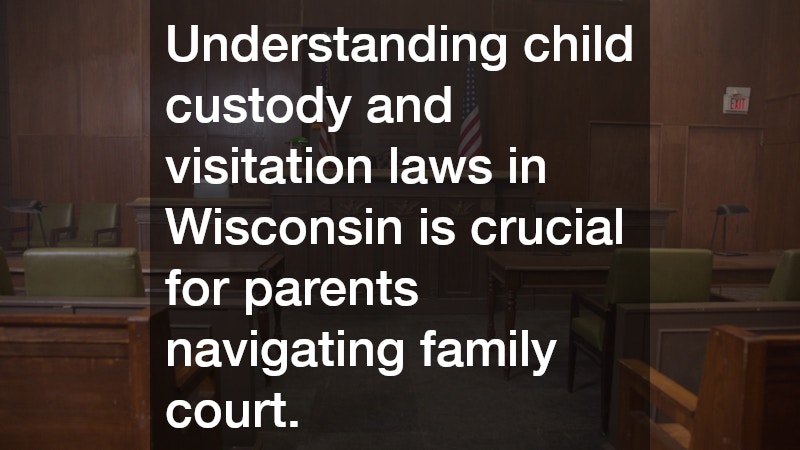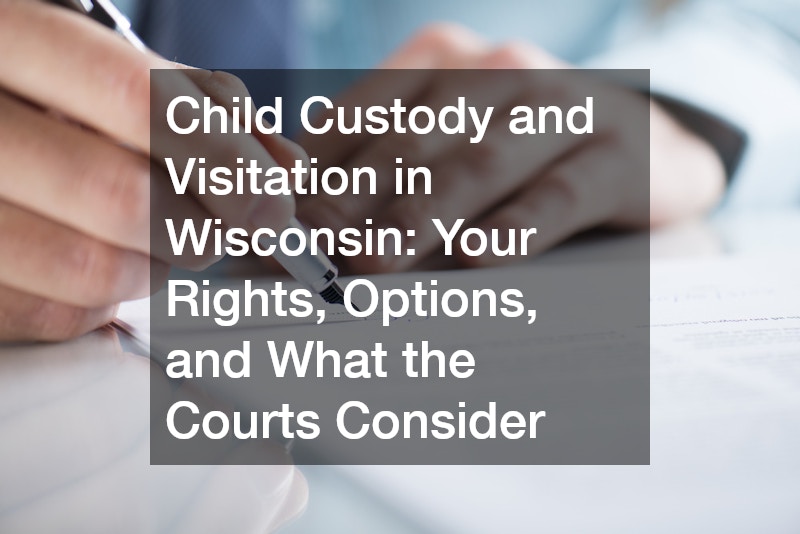
Child Custody and Visitation in Wisconsin: Your Rights, Options, and What the Courts Consider
Understanding child custody and visitation laws in Wisconsin is crucial for parents navigating family court. These cases often involve high stakes, emotions, and complex legal considerations. Hiring a knowledgeable family lawyer can help parents protect their rights and make informed decisions for their children. This article explores the key aspects of child custody and visitation in Wisconsin, including available arrangements, court considerations, and how parents can prepare for hearings.
What Types of Custody Arrangements Are Available in Wisconsin?
Legal Custody vs. Physical Custody
In Wisconsin, child custody is divided into legal custody and physical custody. Legal custody determines which parent has the right to make significant decisions about the child’s upbringing, including education, healthcare, and religious practices. Physical custody, on the other hand, governs where the child lives and the day-to-day care responsibilities. Understanding the distinction between the two is critical, as parents may share one type of custody while differing in the other.
Joint Custody Options
Joint custody is common in Wisconsin, allowing both parents to share decision-making responsibilities and/or physical placement of the child. Joint legal custody enables both parents to participate in important life decisions for their child, while joint physical custody ensures that the child spends significant time with both parents. Successful joint custody arrangements typically require strong communication and cooperation between parents.
Sole Custody Dynamics
In certain situations, the court may grant sole custody to one parent. This usually occurs when joint custody is not in the child’s best interests, such as in cases involving abuse, neglect, or lack of parental involvement. Sole custody grants one parent primary decision-making authority and physical placement, while the other parent may have visitation rights.
Shared Placement Schedules
Wisconsin courts often encourage shared placement schedules when feasible. These schedules can vary widely, from alternating weeks to split weekends and holidays. The goal is to provide stability for the child while maintaining meaningful contact with both parents. Courts aim to craft schedules that align with the child’s age, school, extracurricular activities, and other practical considerations.
How Do Courts Determine the Best Interests of the Child?
Factors Considered by the Court
Wisconsin courts focus on the best interests of the child when making custody decisions. Key factors include the child’s physical, emotional, and educational needs, as well as each parent’s ability to meet those needs. Courts also consider any history of domestic violence, substance abuse, or neglect.
The Role of the Parents’ Availability
A parent’s availability to care for the child is another important consideration. Courts review work schedules, flexibility, and the ability to provide consistent daily care. Parents who can demonstrate stability and active involvement in the child’s life often have an advantage.
Child’s Needs and Preferences
The child’s age, maturity, and preferences can also influence custody decisions. While younger children’s preferences carry less weight, older children may be consulted to provide insight into their living arrangements. Courts carefully balance these preferences with the overall best interests of the child.
Parental Cooperation and Communication
Courts favor parents who can demonstrate a willingness to cooperate and communicate effectively. High-conflict situations or parental hostility can negatively impact custody decisions. A parent who promotes the child’s relationship with the other parent is generally viewed more favorably.
What Visitation Rights Do Non-Custodial Parents Have?
Standard Visitation Schedules
Non-custodial parents typically receive standard visitation rights, which may include alternating weekends, holidays, and summer breaks. These arrangements are designed to ensure meaningful contact while maintaining the child’s stability.
Supervised Visitation Requirements
In certain circumstances, the court may require supervised visitation, particularly when concerns about safety, abuse, or neglect exist. Supervised visits ensure the child’s welfare while allowing the non-custodial parent to maintain a relationship.
Enforcing Visitation Orders
If visitation rights are not respected, legal avenues exist for enforcement. Parents can file a motion with the court to compel visitation or seek modifications to the custody arrangement. Working with a family law attorney can help ensure that visitation orders are upheld.
How Can Parents Prepare for a Child Custody Hearing?
Gathering Necessary Documentation
Preparation is critical for custody hearings. Parents should gather documents such as school records, medical records, communication logs with the other parent, and evidence of parental involvement. These materials help demonstrate their ability to meet the child’s needs.
Working with a Family Lawyer
A skilled family lawer can guide parents through the process, explain rights, and present the strongest case in court. Attorneys also provide advice on negotiation, mediation, and potential custody arrangements.
Courtroom Etiquette and Presentation
Parents should conduct themselves professionally during hearings, showing respect for the court and all parties involved. Demonstrating composure, honesty, and focus on the child’s best interests can positively influence the court’s decision.
Conclusion
Navigating child custody and visitation in Wisconsin requires a clear understanding of legal rights, available options, and the factors courts consider. Parents who educate themselves and work with an experienced family law attorney are better positioned to make informed decisions that prioritize their child’s well-being. Whether seeking joint custody, sole custody, or preparing for visitation disputes, understanding the process is the first step toward achieving a fair and stable outcome for all involved.

